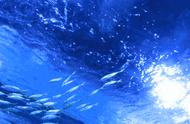
Although we've come a long way with space exploration, we have a long way to go with ocean exploration.
一名戴水肺的潜水员正在探索热带珊瑚礁的水下洞穴。
Oceans make up about 71 percent of Earth's surface. They're immensely important to the health of Earth and those of us who inhabit it. There are five main oceans: the Atlantic Ocean, Pacific Ocean, Indian Ocean, Arctic Ocean and Southern Ocean, so when we say the "world's ocean" or "the ocean," we are referring to all these ocean basins together.
海洋约占地球表面的71%。它们对地球的健康以及我们这些居住在地球上的人的健康非常重要。世界上有五大大洋:大西洋、太平洋、印度洋、北冰洋和南大洋,所以当我们说“世界海洋”或“海洋”时,我们指的是所有这些海洋盆地的总和。
The ocean drives weather patterns, regulates temperature and ultimately supports all living organisms. It's been a vital source of sustenance, transportation and commerce throughout history.
海洋驱动天气模式,调节温度,并最终支持所有生物。在历史上,它一直是维持生计、运输和商业的重要来源。
Yet, just 5 percent of the global ocean has been explored and less than 10 percent has been mapped using modern sonar technology. If we can send satellites millions of miles into space, then why has so much of the ocean's wild frontier been left unmapped, unobserved and unexplored?
然而,全球只有5%的海洋被探索过,使用现代声纳技术绘制的海洋地图不到10%。如果我们可以将卫星发射到数百万英里外的太空,那么为什么还有那么多海洋的荒野尚未被绘制、观察和探索呢?
Well, it's complicated. 这很复杂。
Why Has So Little of the Ocean Been Explored? 为什么被探索的海洋如此之少?
ROVs (remotely operated vehicles) are very useful in the exploration of the deep ocean floor without the need to send divers who might be subject to risk. ROVs rely on ocean currents to carry them along.
rov(远程操作的潜水器)在深海海底的探索中非常有用,而不需要派遣可能面临风险的潜水员。rov依靠洋流带着它们前进。
First, there's a lot more to the ocean than meets the eye. We've always been able to explore the ocean's surface. But we've only just started looking into the ocean depths and sea floors within the past few decades. Satellites have helped us chart the ocean's surface temperatures, waters and colors (which can indicate plant life). More advanced technology is needed to dig deeper, so to speak. Submarines and sonars have helped with that.
首先,海洋比我们看到的要复杂得多。我们一直能够探索海洋表面。但在过去的几十年里,我们才刚刚开始研究海洋深处和海底。卫星帮助我们绘制了海洋表面的温度、水域和颜色(这可以表明植物的生命)。可以这么说,需要更先进的技术来深入挖掘。潜艇和声纳在这方面有所帮助。
But when you reach the deep ocean about 650 feet (200 meters) or more below the water's surface, you leave the so-called "sunlight zone" and enter complete darkness. At these great depths, you lose all visibility. It's also extremely cold and the pressure is body-crushing.
但当你到达水面以下650英尺(200米)或更深的深海时,你就离开了所谓的“阳光区”,进入了完全的黑暗。在这么深的地方,你完全看不见。天气也非常寒冷,压力大得让人受不了。
For perspective, at sea level, the pressure on your body is about 15 pounds per square inch (103.42 kilopascals). If you float above Earth's atmosphere into space, your body pressure decreases to zero. But if you drop deep into the ocean's depths, that pressure increases the deeper you go. If you were to go to the bottom of the Mariana Trench — the deepest part of the ocean, about 7 miles (11.2 kilometers) deep — you would feel about 1,000 times more pressure than what you would feel on the surface or the equivalent of about 50 jumbo jets pressing down on your body.
从海平面的角度来看,你身体上的压力大约是每平方英寸15磅(103.42千帕)。如果你漂浮在地球大气层之上进入太空,你的身体压力会下降到零。但如果你沉入海洋深处,压力就会越深越高。如果你去马里亚纳海沟的底部——海洋最深的部分,大约7英里(11.2公里)深——你会感到比你在海面上感受到的压力大1000倍,或者相当于大约50架大型喷气式飞机压在你身上。
As you can see, deep sea exploration is tough. But there is still hope to learn more. Agencies such as the National Oceanic Atmospheric Administration (NOAA) are leading efforts in ocean exploration by supporting expeditions to investigate and document unknown and little-known regions.
如你所见,深海探索是艰难的。但仍有希望了解更多。美国国家海洋大气管理局(NOAA)等机构通过支持考察和记录未知和鲜为人知的地区,在海洋探索方面发挥着主导作用。

It's difficult to protect our ocean if we know so little about it. And there are countless reasons why we should protect it. The ocean produces more than half of the world's oxygen. It also helps regulate weather patterns, provides food and medicine and bolsters trade among nations around the globe.
如果我们对海洋知之甚少,就很难保护它。我们有无数的理由要保护它。海洋产生了世界上一半以上的氧气。它还有助于调节天气模式,提供食品和药品,并促进全球各国之间的贸易。
,














